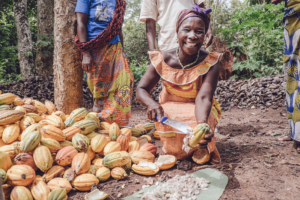Ghana’s Efforts in Cocoa Sustainability
 Ghana, renowned as the “Cocoa Kingdom,” stands as a global powerhouse in the production of cocoa beans, a vital commodity that plays a pivotal role in the nation’s economic landscape. As the backbone of Ghana’s agricultural sector, cocoa contributes significantly to employment, export earnings and overall economic growth. However, with this economic importance comes a set of challenges, prompting Ghana’s cocoa sustainability journey. In doing so, the nation not only ensures the longevity of its cocoa industry but also addresses crucial aspects of economic growth and poverty reduction. As the OPEC Fund For International Development discusses, cocoa influences not only Ghana’s economic landscape but also plays a significant role in shaping the nation’s identity and even its climate outlook.
Ghana, renowned as the “Cocoa Kingdom,” stands as a global powerhouse in the production of cocoa beans, a vital commodity that plays a pivotal role in the nation’s economic landscape. As the backbone of Ghana’s agricultural sector, cocoa contributes significantly to employment, export earnings and overall economic growth. However, with this economic importance comes a set of challenges, prompting Ghana’s cocoa sustainability journey. In doing so, the nation not only ensures the longevity of its cocoa industry but also addresses crucial aspects of economic growth and poverty reduction. As the OPEC Fund For International Development discusses, cocoa influences not only Ghana’s economic landscape but also plays a significant role in shaping the nation’s identity and even its climate outlook.
Cocoa’s Economic Significance in Ghana
Cocoa cultivation is deeply ingrained in Ghana’s economic fabric, directly employing millions of Ghanaians and providing income and livelihoods for farmers and their families. The revenue generated from cocoa exports significantly contributes to the country’s foreign exchange earnings. Globally in 2019, around 800,000 people working in the cocoa industry accounted for a market value of up to $760 million, according to the the International Institute For Sustainable Development (IISD) making cocoa a cornerstone of economic stability.
The Promotion of Sustainable Cocoa Farming
In acknowledgment of the challenges the cocoa industry faces, Ghana has proactively recognized the need for sustainable practices. Environmental degradation and deforestation threaten the delicate ecosystems supporting cocoa cultivation, while ethical concerns emphasize the importance of fair labor practices. As a response, Ghana focuses on transforming its cocoa industry into a model of sustainability, aligning economic growth with responsible and ethical practices.
Ghana’s commitment to cocoa sustainability is evident through various initiatives aimed at promoting sustainable farming practices. One of these initiatives is the United Nations Development Programme (UNDP) working with Mondelēz International to incorporate environmental sustainability.
Formed in 2012, Mondelēz International is responsible for the manufacturing and marketing of food and focuses on sustainability with initiatives in place to address environmental and social issues within its supply chain, including efforts relating to sustainable sourcing of cocoa for its chocolate products. The company invests in initiatives that improve sustainability in areas sourcing its ingredients.
The Cocoa Life program in partnership with the UNDP aims to provide cocoa farmers with “economic shade trees” to aid cocoa farms and “make forests more resilient to the risk of pests and diseases.” The positive impact of these initiatives extends to the livelihoods of cocoa farmers and their communities. By embracing sustainable cocoa farming practices, Ghana has witnessed increased crop yields, elevated incomes, and improved access to credit and resources for farmers. Mondelēz International invested $400 million over a decade to uplift and support cocoa farmers.
This, in turn, aids in poverty reduction and enhances the economic resilience of cocoa-farming families. Furthermore, these sustainable practices contribute to environmental conservation and mitigate the effects of extreme weather patterns.
Addressing Poverty Through Sustainable Cocoa Practices
Sustainable cocoa practices are a powerful tool for poverty reduction. By providing farmers with stable and improved incomes, these practices enable them to meet basic needs such as education, health care and housing. This makes the multi-faceted approach beneficial to the overall quality of life in cocoa-producing regions, showcasing Ghana’s commitment to creating a more sustainable and inclusive society.
According to the World Bank, since 2019, reducing carbon emissions that forest degradation causes helped Ghana earn $4.8 million. This could rise to up to $45 million by 2024. Sustainability supports the private sector’s commitments to source sustainably produced cocoa beans, which can fetch better prices and market access for farmers. Ghana’s efforts in cocoa sustainability demonstrate how economic growth and poverty reduction can go hand in hand with environmental conservation and climate action.
– Mia Deniz Duru
Photo: Flickr
